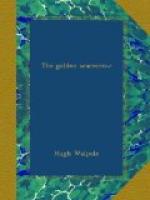His friend had returned.
His impulse was, there and then, to sit down.
His friend was whispering: “Come along!... Come along!... Come along!” He knew that, on his surrender, his father would make sounds like, “Well, old man, tired, eh? Bed, I suggest.” He knew that bed would follow. Then darkness, then his friend.
For an instant there was fierce battle between the old forces and the new. Then, with his eyes upon his father, resuming that hiss that is proper only to ostlers, he continued his march.
He reached the wall. He caught his father’s leg. He was raised on to his father’s lap, was kissed, was for a moment triumphant; then suddenly burst into tears.
“Why, old man, what’s the matter?”
But Ernest Henry could not explain. Had he but known it he had, in that rejection of his friend, completed the first stage of his “Pilgrimage from this world to the next.”
CHAPTER III
ANGELINA
I
Angelina Braid, on the morning of her third birthday, woke very early. It would be too much to say that she knew it was her birthday, but she awoke, excited. She looked at the glimmering room, heard the sparrows beyond her windows, heard the snoring of her nurse in the large bed opposite her own, and lay very still, with her heart thumping like anything. She made no noise, however, because it was not her way to make a noise. Angelina Braid was the quietest little girl in all the Square. “You’d never meet one nigher a mouse in a week of Sundays,” said her nurse, who was a “gay one” and liked life.
It was not, however, entirely Angelina’s fault that she took life quietly; in 21 March Square, it was exceedingly difficult to do anything else. Angelina’s parents were in India, and she was not conscious, very acutely, of their existence. Every morning and evening she prayed, “God bless mother and father in India,” but then she was not very acutely conscious of God either, and so her mind was apt to wander during her prayers.
She lived with her two aunts—Miss Emmy Braid and Miss Violet Braid—in the smallest house in the Square. So slim was No. 21, and so ruthlessly squeezed between the opulent No. 20 and the stout ruddy-faced No. 22, that it made one quite breathless to look at it; it was exactly as though an old maid, driven by suffragette wildness, had been arrested by two of the finest possible policemen, and carried off into custody. Very little of any kind of wildness was there about the Misses Braid. They were slim, neat women, whose rather yellow faces had the flat, squashed look of lawn grass after a garden roller has passed over it. They believed in God according to the Reverend Stephen Hunt, of St. Matthew-in-the-Crescent—the church round the corner—but in no other kind of God whatever. They were not rich, and they were not




